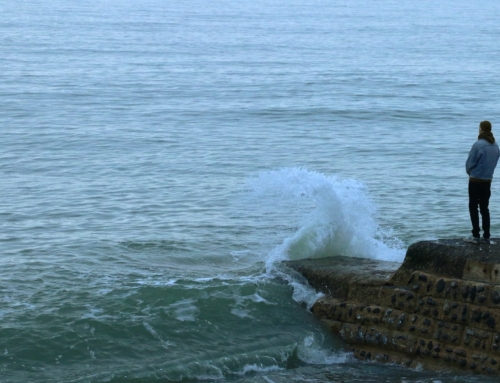Try sitting perfectly still for five minutes. Just sit there and don’t move a muscle.
Now go one step further. Sit still and don’t watch television, listen to music, read, or talk with another person. Just sit and do nothing.
Now go one step further. Sit still and only think one thought. Let go of all other thoughts that flow through your head.
Mystics go even one step further. Even their one thought is replaced by a gaze.
Sound impossible?
A Culture of Busy-Ness
Our modern culture values busy-ness as its highest value. Our city centers have replaced cathedrals, where people would gaze upon the beauty and light of God, with towers of busy-ness. Early modern and modern Christianity have replaced contemplative spirituality with a “muscular” and “active” spirituality that emphasizes doing over being. Not only did Protestants deplore and pull down contemplative monasteries in the sixteen and seventeenth centuries, but Catholic religious orders began to emphasize preaching, teaching, and serving (called “apostolic ministries”) rather than mere contemplation. To be “busy” was to be more godly.
Prayer is difficult for modern people because it is not “active” enough. So we tend to turn it into an activity. We form prayer groups where we talk about what we should pray for and then pray for five to ten minutes at the end of an hour. We make lists of intercessions. We write out prayers and litanies, we sing songs, play music, record and sell music, and write books on prayer.
Prayer seems so useless in reality. Medieval monks only prayed or chanted prayer. That was their primary “work.” It was mere worship. Of course, that’s what angels do, but that’s in heaven, after death. Mark Twain said he didn’t want to go to heaven because he liked sex and hated singing.
Stilling the Heart and Soul
“Be still and know that I am God,” writes the psalmist. (Ps 46.10) Elijah was unable to hear God in the whirlwind, earthquake, and fire, but only in that “still small voice.” (1 Ki 19.11-13) “Be still before the Lord and patiently wait for Him,” writes the psalmist again. (Ps 37.7)
Although we believe that we are not “saved by works,” we often fall into the trap of believing that we are “saved by work.” It is difficult to “let go and let God” because God’s timing isn’t our timing and we are unable to see or to understand God’s plan. So we take charge. And yet we have difficulty hearing God’s voice through all our busy-ness.
Be still. We need to still our bodies, still our emotions, still our thoughts, still our desires, still our expectations, still our consciences. This is how we can experience the “peace of God that passes all understanding.” (Phil 4.7) “And the things of this world will grow strangely dim in the light of His glory and grace,” says the hymn.
The Gaze of God
Living in the love of God is not that complicated. Augustine wrote in the fourth century, “Love God and do as you please” because if we love God, our pleasure will be God’s pleasure, our will will be God’s will. “The effect of righteousness will be peace, and the result of righteousness, quietness and trust forever.” (Isa 32.17) “Aspire to live quietly, and to mind your own affairs, and to work with your hands as we instructed you.” (1 Thess 4.11)
Gazing upon God in stillness reorients all our busy-ness to God’s eternal love. We “turn our eyes upon Jesus and look full in His wonderful face.” We become like Mary sitting at the feet of Jesus, hanging not only upon His every word, but onto His very presence. (Lk 10.38-42)
A Christian Counselor Can Help You Find Stillness in the Midst of Storms
In the midst of all your responsibilities that seem to require much busy-ness, it is often difficult to discern and put into practice ways that build peace and stillness in your life. A Christian counselor or spiritual director can help you to implement techniques that you can use to help still your body, emotions, thoughts, desires, expectations, and even your conscience so that you are better able to experience the deep love of God in your life.
Photos“Jogging,” by federico slevanin, FreeDigitalPhotos.net, Image ID: 1005404; “Bright Sun and Cloud,” by tungphoto, FreeDigitalPhotos.net, Image ID: 10023476










